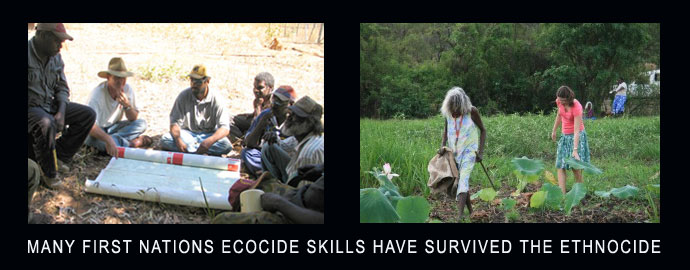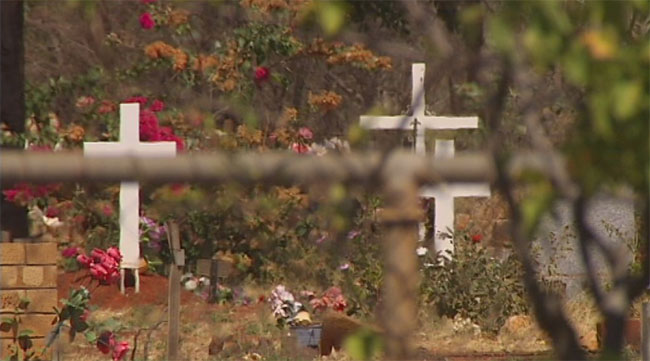First Nation knowhow to help save our landscapes

Australian Centre for Ecological Analysis and Synthesis
8 May 2014
The deep knowledge of First Nation (Aboriginal) people is being called on as part of a nationwide effort to stem the tide of extinction and decline that is engulfing the Australian landscape and its wildlife.
At a major scientific meeting in Canberra this month, a new website will be unveiled which brings together thousands of records documenting Aboriginal traditional knowledge about Australian native landscapes, plants and animals.
 First Nations elders launch a campaign to tackle youth suicide
First Nations elders launch a campaign to tackle youth suicide
 Australian First Nations people – misunderstanding their science
Australian First Nations people – misunderstanding their science
The knowledge is presented in the form of a world-first map, which records publically-available Australian Indigenous bio-cultural knowledge (IBK) that is place-based. The detailed content of the identified documents is only made available with the express permission of the Aboriginal communities which own it.
Aboriginal people and non-Indigenous scientists and managers are currently working together on hundreds of projects across Australia to understand and better manage country using a combination of indigenous bio-cultural knowledge and ecological science.
The map draws together, for the first time worldwide, the wealth of projects, documents, reports, research and management plans where Indigenous bio-cultural knowledge is being used and Aboriginal people are adding value to today's understanding of Australian ecology and land management practices.
This website maps the places where projects have been or are being carried out, documents results and provides examples of current leading practice, useful information and case studies of "living knowledge" and its practical application.
These include cases of Aboriginal-led landscape restoration, fire management, knowledge about native plants and animals and knowledge about wetlands and other important ecosystems.
"This is the first time that Aboriginal knowledge about landscape and Australian ecological science have been brought together across the whole continent in a single resource," says ACEAS director Associate Professor Alison Specht
"It also represents a major contribution to documenting and preserving traditional knowledge for future generations of Aboriginal people – and for all Australians."
The project is part of a worldwide trend to bring the knowledge held by First Nation peoples together with science and conservation policy, and makes Australia one of the global leaders in this field, she says.
"We have shown that all of Australia's conservation priorities could be greatly informed by Indigenous bio-cultural knowledge - although the existing opportunities far outweigh the advances made to date," says the team behind the project, in a soon to be published discussion paper. The ACEAS IBK Working Group is led by Dr Emilie Ens and includes twenty Indigenous and non-Indigenous researchers and land managers from around Australia.
"Threats to global environments are increasing, so it is timely to rethink our ecological knowledge base and develop more holistic and inclusive research, management and funding options for the future.
"Enhanced cross-cultural and cross-disciplinary engagement has great potential to strengthen global capacity to build socio-ecological resilience for … inclusive and sustainable environmental management strategies."

David Stacey Medical Express 22 April 2014
Thirty-one Elders and community representatives from 17 Aboriginal and Torres Strait Islander communities around Australia have contributed to a powerful report into self-harm and suicide in which they offer ways in which to address the tragedy.
 Almost half of the youths under supervision are First Nations
Almost half of the youths under supervision are First Nations
 Hundreds more young people will suicide before 2015
Hundreds more young people will suicide before 2015
 Nothing will be done about the suicides crisis states expert
Nothing will be done about the suicides crisis states expert
Released last week, the report - which took almost two years to complete - is a response to the escalating epidemic in modern Australia in which more and more Aboriginal and Torres Strait Islander Australians - in particular youth - are taking or attempting to take their own lives.
In her introduction to The Elders' Report into Preventing Indigenous Self-Harm and Youth Suicide Professor Pat Dudgeon from The University of Western Australia's School of Indigenous Studies (SIS) writes: "Almost non-existent before the 1980s, youth suicide across the entire top end of Australia has reached crisis proportions."
A UWA Research Fellow and Director of the SIS-led National Empowerment Project which is addressing Aboriginal and Torres Strait Islander suicide and social and emotional wellbeing, Professor Dudgeon is one of Australia's first Indigenous psychologists. She said several factors were involved in the crisis: the brutal history of colonisation, the Stolen Generations' trauma, ongoing racism, unemployment, poverty, overcrowding, marginalisation and higher access to alcohol and drugs.
"With muted voice, the pain and hurt being experienced by our young is being turned upon themselves," Professor Dudgeon said. "While successive Governments have made concerted efforts to improve Aboriginal and Torres Strait Islander mental health, little headway has been made in stemming this dark tide of suicide in our communities."
Professor Dudgeon said mainstream Australia needed to recognise there are distinct cultural differences between non-Indigenous and Aboriginal and Torres Strait Islander people that must be taken into account in the way help is provided.
"And any crisis will not be solved unless partnerships are formed with Aboriginal and Torres Strait Islander people, both in identifying the problem and delivering the solution. As the vital bridge between the modern world and Aboriginal culture, our Elders are fundamental in this process," she said.

